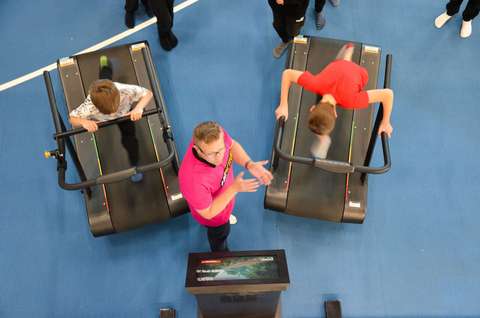Exergame project adds over 1,500 hours of physical activity

Exergames have added everyday physical activity at all pilot sites. Exergames encourage physical activity in spaces where it is otherwise not possible. During spring 2025, there have been 25 experiments with seven companies producing exergames.
Espoo is currently implementing the Exercise Through Games project, which studies the systematic utilisation of exergames in education and teaching units. The project continues the work on exergames that the City of Espoo started through the Modernizing Sport to Foster a New Generation EU project, which was implemented in 2022–2024.
Exergames are excellent for turning passive spaces into places that encourage physical activity. The most successful exergame experiments in Espoo have taken place in schools. The iWall exergame wall in Viherlaakso primary school has already seen more than 100,000 minutes of use over a few years. In the past four months, the iWall sports wall at the Mattliden school, has seen up to 17,789 minutes, or 296 hours, of use.
The pupils are excited about the exergames, which are also motivators for completing school assignments.
“Pupils who are not specifically motivated by completing assignments have put in the effort to play the exergames,” says Tuukka Kallio, a classroom teacher and coordinator of learning technology development at Viherlaakso School.
Versatility is the strength of exergames
Schools and early childhood education have noticed that exergame solutions not only boost physical activity but also improve enjoyment at school satisfaction and create a sense of cohesion. Exergames are a combination of video games and exercise, which makes them an attractive way to exercise and learn. In exergames, players control the game with their own bodies. Espoo's schools have tried out various exergames, such as dance and balance games, which can also help to develop their pupils’ motor skills.
In feedback on sports game experiments, the participating teachers have been positive about the fact that exergames are potential ways of getting their more passive pupils to be active. Teachers see value in how exergames also allow experiential lessons. Based on the survey, the players have also found the trialled exergames to be easy to learn and use.
The main objective of the project is to boost physical activity for children and young people and particularly to get more passive children and young people to be physically active. These trials have shown that exergames can be an effective way to boost physical activity and improve the pupils’ well-being and sense of community.
“The best user experiences are definitely the ones where a usually reclusive pupil discovers group exercise through exergames,” says Project Coordinator Oona Koivula.
Pupils and teachers both have become familiar with exergames at the spring events
Exergames have introduced the Exercise Through Games project to units and various events. For example, Espoo teamed up with physiotherapists from Laurea University of Applied Sciences to hold an exergame day at Viherlaakso School, which attracted about 250 pupils to try out different exergames and test their motor skills. During the project, similar exergame events have introduced physical activities to GameJam and LAN party events at upper secondary schools.
Early childhood education groups also took part in an exergame event when the Exercise Through Games project joined forces with Leiki ja liiku activities. These activities, held at Hybridiarena Hype, received an interactive exergame platform for a week, which added new twists to their regular activities.
Exergames – a tool for boosting everyday physical activity in Espoo
The aim is to establish exergames as a tool for boosting physical activity in Espoo's day-care centres, schools and upper secondary schools. Sports Planner Kimmo Leinonen sees the significance of exergames as a growing trend.
“Exergames make for a far more active school life in a completely new way. They differ from traditional ways of creating physical activity during recess, such as by giving the target group interesting activities when they would normally spend the time sitting down. Compared to guided physical activity, exergames are cost-effective and encourage people to be active on their own. Exergames combine the attractiveness and ease of video games and the well-being of daily exercise.”
However, exergames are not without issues for early childhood and comprehensive education.
“We are constantly working to ensure that both units’ facilities and the development of exergame content allow their smooth use. What we want is for sports games to fit seamlessly into the everyday activities of the units. For this purpose, we will be creating a tip and material bank for exergames during the project,” Koivula says.
The Exercise Through Games project will continue through 2025, with further trials the autumn. The project Exercise Throuhg Games is funded by the government Get Finland Moving programme, which aims to increase physical activity across all age groups (www.suomiliikkeelle.fi(external link, opens in a new window)).
More information on the Exercise Through Games project is available on the project website here.